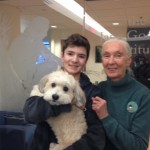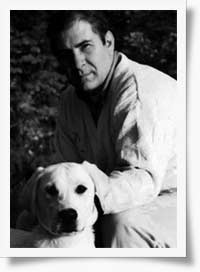 Jane Goodall’s vision for her life began to form at the age of five when she hid in a chicken coop to see if she could discover “where on a chicken was there an opening big enough for an egg to come out.” She still recalls tumbling out of the hen house in excitement to tell her mother her discovery.
Jane Goodall’s vision for her life began to form at the age of five when she hid in a chicken coop to see if she could discover “where on a chicken was there an opening big enough for an egg to come out.” She still recalls tumbling out of the hen house in excitement to tell her mother her discovery.
Shortly thereafter — by the age of eight — she had fallen in love with Tarzan and decided she wanted to live in Africa. “I knew that, somehow, I would go to Africa and live with the animals,” she says. “I don’t think I spent too much time wondering exactly how I would do it. I just felt sure the right opportunity would somehow come.”
At the age of twenty-three, her dream came true. She was invited to visit a friend whose family had bought a farm in Kenya. While she was there, she met Louis Leakey — the man who, more than anyone else, shaped the direction of her life.
The renowned anthropologist offered her a job on the spot, at first working as his secretary, then in the fields of Olduvai Gorge. But Jane wanted more. She wanted to find a way to watch wild animals living undisturbed lives. She wanted to bridge the distance between man and beast and move among them without fear. She wanted to return to the hen house and discover the secrets of the natural world.
She was twenty-six when she first set foot on Gombe National Park. On her sixty-second birthday, 18 years ago today, we met in Washington. The thirty-minute morning meeting we had scheduled turned into lunch, dinner, and then a bit of scotch as we talked into the night about the state of the world, the gift of the forest, and the “fuzzy line” between man and beast.
“Chimpanzees are so like us,” she said. “Their blood and their response to disease are like ours. A lot of their behavior is like ours. They learn by watching one another, then imitating. Most important, they feel pain, sorrow, and fear just like we do.”
She illustrated the closeness of the connection by telling the story of Old Man, a chimpanzee brought to a zoo in North America when he was an adolescent. “We still don’t know what happened to him there,” Jane said, “but whatever it was, he came to hate people.”
When Old Man was rescued, he was put on an island with three females. A young man named Marc Casano was given the job of looking after them. He was told how dangerous these animals were and instructed not to go on the island with their food. Instead, he was told to paddle a boat toward the island until he was close enough to throw the food on the shore and then leave.
Marc did as he was told but as he watched the animals he couldn’t help noticing how affectionate they were with each other. He decided he wanted to have a better relationship with them and tried to make friends. He came closer and closer to shore until he could actually hand Old Man a banana. Soon the two were playing together. Eventually, Old Man would even let Marc groom him — an act of complete trust.
One day, Marc slipped and fell, startling an infant nearby. The mother heard the cry and charged protectively, leaping on Marc’s back and biting his neck. Before Marc could get up, the other two females joined the attack. He felt his arm go numb and blood running down his neck. He looked up to see Old Man flying toward him.
But instead of joining the attack and finishing him off, as Marc feared, Old Man seized the females, pulling them off and hurling them away. He stayed close as Marc dragged himself to the boat, threatening the females every time they tried to attack again.
“Old Man saved Marc’s life,” Jane said. “There is no doubt about it. The chimps could easily have killed him.”
“I tell this story a lot,” she went on to say, “because it says so much about our relationship with chimps and other animals. If a chimpanzee can reach out to help a human, then surely humans can reach out and try to help chimps and other living creatures.”
Jane’s understanding of nature — the gift of the forest — and her resulting reverence for life has led her to campaign for compassion. The woman who yearned for the jungle at the age of eight and spent 36 years living in solitude and solidarity with wild animals, now spends most of her time on airplanes, traveling from one urban area to another, never spending more than two weeks in one place at a time.
“I hate my suitcases, packing, unpacking. Ironing — I hate ironing,” she says. “But it is all made worthwhile when I think of the forest and what it has given me. It makes me sad that I can only get back there for short visits, but then I think of how lucky I have been. I have spent years doing what I wanted to do most of all – being with wild, free chimpanzees in the forest. Now is my paying back time.”
Her central message is the unity of life. “It is not one thing to save man and another to save the animals,” Jane says. “Together, we can make the world a better place for all living things.”
 At our house, we never knew who would be joining us for dinner. My mother lost her mother at an early age. All of her life she carried vivid memories of being passed from hand to hand, relative to distant relative, doing without and never quite feeling like she belonged. In her house, all were welcome. Everyone belonged.
At our house, we never knew who would be joining us for dinner. My mother lost her mother at an early age. All of her life she carried vivid memories of being passed from hand to hand, relative to distant relative, doing without and never quite feeling like she belonged. In her house, all were welcome. Everyone belonged.




